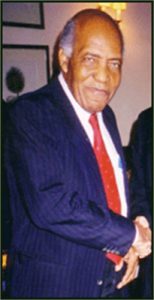Leigh Isiah Allison Richardson, 1924 – 2008

When on October 31, 2008, Belizeans living in Brooklyn, New York, gathered in the St. Joseph Anglican Church to pay their last respects to Leigh Richardson it represented the culmination of a life that had been dedicated to the founding and the building of the nationalist movement in Belize during the early 1950s.
Leigh Richardson was born on April 26, 1924 in Puerto Castillo in the Republic of Honduras to Leigh and Egzine Richardson. He was one of nine children, and at the age of five years he returned with his parents to their home country Belize. His marriage to Eva Young produced eight children. In his early life he taught at Wesley College, but soon after became involved in the professions of journalism and party politics.
In historical context, the main event which was responsible for the political awakening in Belize, which largely involved Richardson and which in fact was responsible for sparking the whole nationalist movement, was the devaluation of the country’s currency on December 31, 1949. That event triggered a political transformation which might not have otherwise taken place so early. Along with Philip Goldson, John Smith, George Price and other nationalists Richardson formed the People’s Committee in early 1950, which later became the People’s United Party (P.U.P.) in September of the same year.
As a member of the People’s Committee, Leigh Richardson was constant in asserting national consciousness in the minds of the Belizean people. In August of 1950 he called for a national party that would work for eventual self-government. He was convinced that the only way to create a healthy climate was to create a national political front “which would oppose lawfully every individual, every restriction, and every condition that smacked of oppression under the guise of British freedom.” With the coming into being of the P.U.P. on September 29, 1950, Richardson was elected Party Chairman under the leadership of John Smith.
Leigh Richardson served as co-editor of the Belize Billboard along with Philip Goldson from 1950, and being very radical personalities, legal action for seditious intent was taken against the newspaper on two occasions. In the first instance, January 1951, the sedition charges against both journalists were withdrawn when they apologized for the remarks they had made about the Governor. On the second occasion, in October 1951, the four proprietors of the Belize Billboard (Philip Goldson, Leigh Richardson, Armando Diaz and Lindberg Goldson) were charged with publishing words in the newspaper with seditious intent. After a trial which lasted one week and ended on November 5, 1951, a jury found Goldson, Richardson and Diaz guilty, and acquitted Lindberg Goldson. Diaz was fined, while Goldson and Richardson were each given jail sentences of twelve months with hard labor. They were released in July of 1952.
After John Smith stepped down as Party Leader, Richardson was elected to that position at the P.U.P’s yearly convention on September 30, 1953. His first venture into elective politics had been when he contested Belize City Council elections on November 20, 1950, and the P.U.P. candidates won a majority of seats. In 1954, contesting the country’s first general election under semi-universal adult suffrage Richardson, representing Belize West, was one of the eight P.U.P. candidates elected to the Legislative Assembly.
At the yearly Party convention held on September 22, 1954 Richardson, after being re-elected Party Leader, called for the people to be given additional responsibility in the running of Belize’s affairs. His appeal for the granting of the ministerial system of government had the result of three elected members of the Legislative Assembly being granted responsibilities for Natural Resources, Social Services and Public Utilities. Richardson held the post of Member for Natural Resources, and the following year Development Concessions was also included in his portfolio.
The Party’s position had always been to steer clear of any form of federation, so that when Richardson advocated in 1956 that “Belize should not completely close the door on a possible union with the West Indies” certain factions of the P.U.P. interpreted that statement to be slightly pro-federation.
A drastic change in Richardson’s political life occurred on September 27, 1956 at the Party’s annual convention when he along with other members signed a declaration which was considered as slanderous against Nicholas Pollard and George Price. At that point he resigned from the P.U.P. and along with several of the former P.U.P. members, went on to form the Honduran Independence Party (H.I.P.) on October 4, 1956. He emphasized that his party “stood firmly on the side of freedom and democracy, reason and integrity.” On October 15, 1956, he was elected Party Leader, and after his party unsuccessfully contested the general elections of March 20, 1957, he relinquished his post as Party Leader on February 21, 1958.
Leigh Richardson left Belize in 1958 and first took up residence in Jamaica where he worked for the Jamaica Gleaner; then Trinidad, and finally the U.S.A. where he lived until his death. While residing in Trinidad he attended the University of the West Indies where he earned a Bachelor’s degree in Management Studies. He also taught at St. Anthony’s College and Progressive High School.
On September 18, 2008, Leigh Richardson was formally recognized at the Tribute to Belizean Patriots annual ceremony when he was conferred with the Order of Distinction by the Government of Belize during the September celebrations. He was truly a patriot whose talent as a politician and contributor to Belize’s fight for self-determination earned him a prominent place in Belize’s heritage and history.

